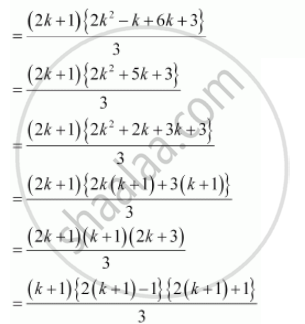Advertisements
Advertisements
Question
Prove the following by using the principle of mathematical induction for all n ∈ N:
Solution
Let the given statement be P(n), i.e.,


Thus, P(k + 1) is true whenever P(k) is true.
Hence, by the principle of mathematical induction, statement P(n) is true for all natural numbers i.e., n.
APPEARS IN
RELATED QUESTIONS
Prove the following by using the principle of mathematical induction for all n ∈ N: 1.2.3 + 2.3.4 + … + n(n + 1) (n + 2) = `(n(n+1)(n+2)(n+3))/(4(n+3))`
Prove the following by using the principle of mathematical induction for all n ∈ N:
Prove the following by using the principle of mathematical induction for all n ∈ N:
(1+3/1)(1+ 5/4)(1+7/9)...`(1 + ((2n + 1))/n^2) = (n + 1)^2`
Prove the following by using the principle of mathematical induction for all n ∈ N:
Prove the following by using the principle of mathematical induction for all n ∈ N: `1+2+ 3+...+n<1/8(2n +1)^2`
Prove the following by using the principle of mathematical induction for all n ∈ N: 102n – 1 + 1 is divisible by 11
Prove the following by using the principle of mathematical induction for all n ∈ N: 41n – 14n is a multiple of 27.
Prove the following by using the principle of mathematical induction for all n ∈ N (2n +7) < (n + 3)2
2 + 5 + 8 + 11 + ... + (3n − 1) = \[\frac{1}{2}n(3n + 1)\]
\[\frac{1}{2} + \frac{1}{4} + \frac{1}{8} + . . . + \frac{1}{2^n} = 1 - \frac{1}{2^n}\]
(ab)n = anbn for all n ∈ N.
Prove that n3 - 7n + 3 is divisible by 3 for all n \[\in\] N .
Let P(n) be the statement : 2n ≥ 3n. If P(r) is true, show that P(r + 1) is true. Do you conclude that P(n) is true for all n ∈ N?
\[\text{ A sequence } a_1 , a_2 , a_3 , . . . \text{ is defined by letting } a_1 = 3 \text{ and } a_k = 7 a_{k - 1} \text{ for all natural numbers } k \geq 2 . \text{ Show that } a_n = 3 \cdot 7^{n - 1} \text{ for all } n \in N .\]
Prove by method of induction, for all n ∈ N:
1.2 + 2.3 + 3.4 + ..... + n(n + 1) = `"n"/3 ("n" + 1)("n" + 2)`
Prove by method of induction, for all n ∈ N:
Given that tn+1 = 5tn + 4, t1 = 4, prove that tn = 5n − 1
Answer the following:
Given that tn+1 = 5tn − 8, t1 = 3, prove by method of induction that tn = 5n−1 + 2
Answer the following:
Prove by method of induction 152n–1 + 1 is divisible by 16, for all n ∈ N.
Prove statement by using the Principle of Mathematical Induction for all n ∈ N, that:
1 + 3 + 5 + ... + (2n – 1) = n2
Prove statement by using the Principle of Mathematical Induction for all n ∈ N, that:
`sum_(t = 1)^(n - 1) t(t + 1) = (n(n - 1)(n + 1))/3`, for all natural numbers n ≥ 2.
Prove statement by using the Principle of Mathematical Induction for all n ∈ N, that:
2n + 1 < 2n, for all natual numbers n ≥ 3.
The distributive law from algebra says that for all real numbers c, a1 and a2, we have c(a1 + a2) = ca1 + ca2.
Use this law and mathematical induction to prove that, for all natural numbers, n ≥ 2, if c, a1, a2, ..., an are any real numbers, then c(a1 + a2 + ... + an) = ca1 + ca2 + ... + can.
Prove by induction that for all natural number n sinα + sin(α + β) + sin(α + 2β)+ ... + sin(α + (n – 1)β) = `(sin (alpha + (n - 1)/2 beta)sin((nbeta)/2))/(sin(beta/2))`
Show by the Principle of Mathematical Induction that the sum Sn of the n term of the series 12 + 2 × 22 + 32 + 2 × 42 + 52 + 2 × 62 ... is given by
Sn = `{{:((n(n + 1)^2)/2",", "if n is even"),((n^2(n + 1))/2",", "if n is odd"):}`
A student was asked to prove a statement P(n) by induction. He proved that P(k + 1) is true whenever P(k) is true for all k > 5 ∈ N and also that P(5) is true. On the basis of this he could conclude that P(n) is true ______.
Prove the statement by using the Principle of Mathematical Induction:
23n – 1 is divisible by 7, for all natural numbers n.
Prove the statement by using the Principle of Mathematical Induction:
n3 – 7n + 3 is divisible by 3, for all natural numbers n.
Prove the statement by using the Principle of Mathematical Induction:
For any natural number n, xn – yn is divisible by x – y, where x and y are any integers with x ≠ y.
Prove the statement by using the Principle of Mathematical Induction:
2 + 4 + 6 + ... + 2n = n2 + n for all natural numbers n.
A sequence b0, b1, b2 ... is defined by letting b0 = 5 and bk = 4 + bk – 1 for all natural numbers k. Show that bn = 5 + 4n for all natural number n using mathematical induction.
Prove that number of subsets of a set containing n distinct elements is 2n, for all n ∈ N.
For all n ∈ N, 3.52n+1 + 23n+1 is divisible by ______.
Consider the statement: “P(n) : n2 – n + 41 is prime." Then which one of the following is true?
By using principle of mathematical induction for every natural number, (ab)n = ______.
